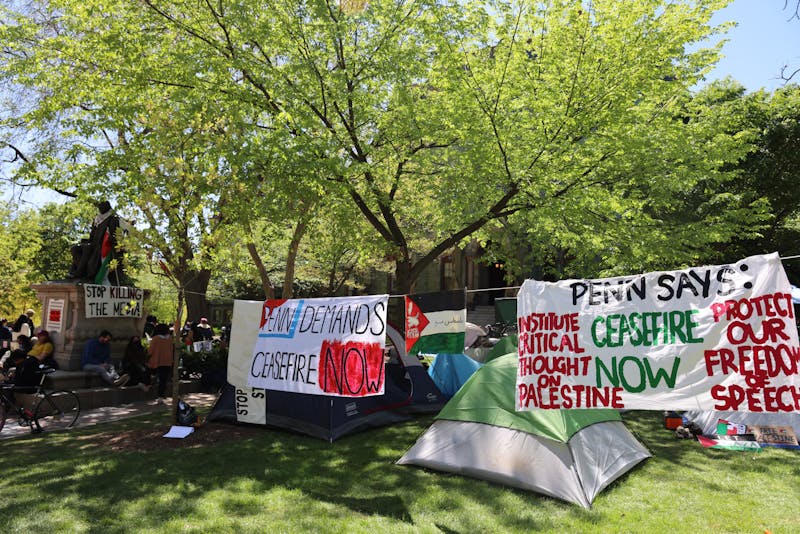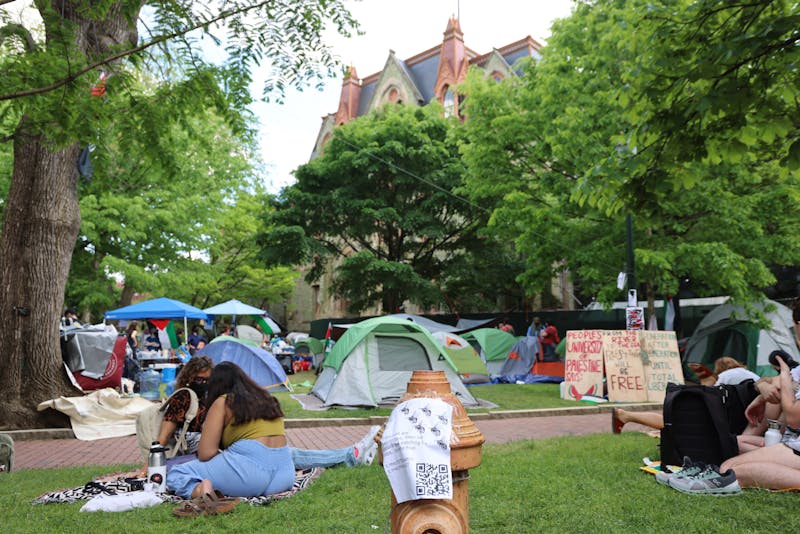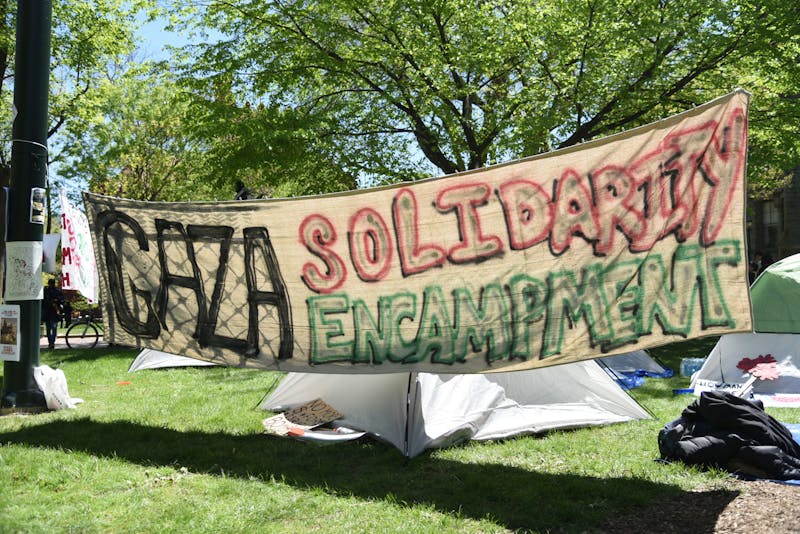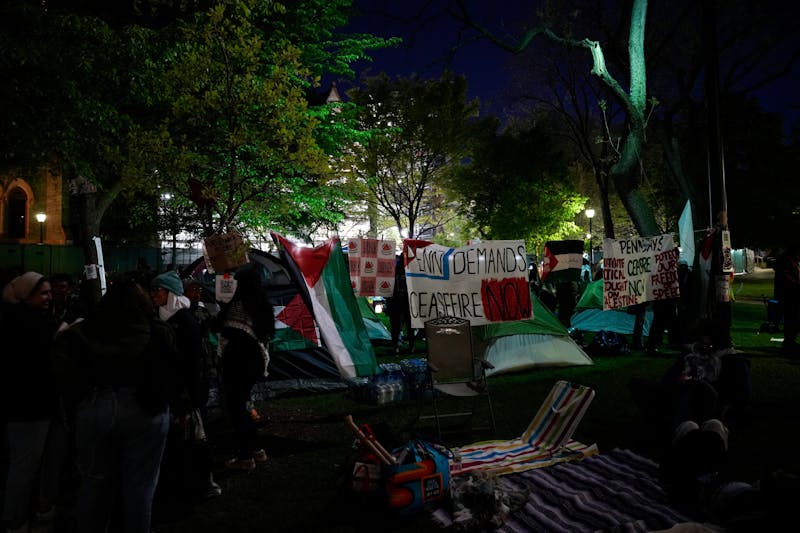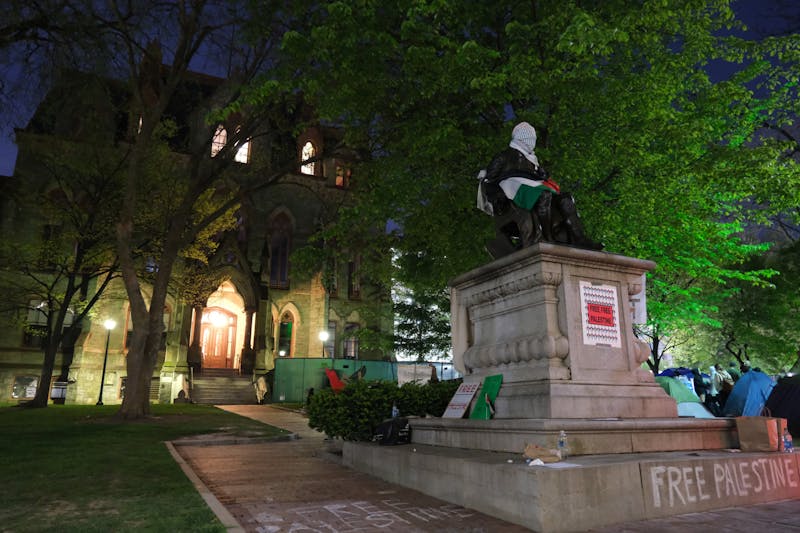
Guest columnist Tulia Falleti writes to resign from the position of Chair of the Faculty Senate.
Credit: Eliud VargasEarly on the morning of May 10, in less than one hour, the Philadelphia police removed the Gaza Solidarity Encampment protesters from the College Green of our campus. Penn students, staff, and faculty, with their hands zip-tied behind their backs, were separated one by one from those embracing them as they sat on the ground or locked arms around the iconic Ben Franklin statue. Not a punch or a rock was thrown; no one so much as spat.
Since April 25, as Chair of the Faculty Senate, I have observed the encampment, walking by its perimeter several times a day. It was a peaceful protest. I wrote so in a guest column published in The Daily Pennsylvanian on May 4, and I stand by my assessment. On May 6, during one of my visits to the perimeter of the encampment, I noticed a person standing behind the white board that announced the events for the day. I entered the encampment a few feet to read the back of the white board. Listed there were 14 “Community Guidelines and Principles.” Number 10 read: “Do not engage with counter-protesters or bad-faith agitators.”
During the two weeks of the encampment, despite events of individualized harassment and intimidation against protesters that were reported to the Penn police and to the Committee on Open Expression, protesters remained non-violent. The speed with which the police were able to dismantle the protest is itself evidence of the protesters’ refusal to resort to violence. Members of our community who characterize chants, signs, flags, even graffiti (which our student protesters covered and asked to be removed) or paint on our beloved founder Ben Franklin’s statue as forms of violence need to turn on their TVs and tune in to violent protests or war scenes from around the world. We can certainly talk about symbolic violence or of hurtful forms of expression, but no one in our campus can say that the encampment that was on College Green from April 25 until this morning — and that included not only Penn members but also members of the larger Philadelphia community — has caused any physical harm or physical violence.
The encampment grew on the evening of May 8, which was of great concern to me. In a worldwide, student-led social movement, in which the encampment — i.e. peaceful protest with tents — is a strategy for protest or part of its main repertoire, its modus operandi, and is the only bargaining power that protesters have, the growth of the encampment’s footprint could only indicate one reality: negotiations with the University administration were not progressing. Was the University negotiating in good faith and with respect for the student protesters as our former President Sheldon Hackney had done when negotiating divestment from South Africa in the early 1980s? I could not tell. Did the encampment occupy part of our University’s lawns? Yes, a tiny fraction of those campus properties on which the institution does not pay property taxes and which expand over a significant part of West Philadelphia. Was it disruptive to our educational mission? No, it was not. The building closest to the encampment, College Hall, is under construction, and as of May 1, there are no more classes on campus. Van Pelt Library is across from the encampment, but even when the chants were at some of their highest volume, our students were studying undisturbed in the library. Students also took graduation photos around the encampment, both in front of College Hall and at the Button and the LOVE statue. It was only on the evenings of May 8 (when negotiations had stopped) and May 9 and this morning that university operations were interrupted as the University prepared to clear the encampment. Had the University taken a different approach, our educational activities and access to buildings would have continued uninterrupted.
I was ending my first year of high school when the last military dictatorship came to an end in my native Argentina. The following year, with my fellow high-school students, we were able to do what the generation before ours could not: We could go into the streets and protest, and we could also occupy our buildings in protest. The generation before mine had been arrested, killed, and disappeared for protesting — even when the cause was free public transit rides for students. Thanks to our newly regained democracy, my classmates and I could join almost weekly protests in support of democracy, of human rights, of justice, or workers’ rights. And our sit-ins and building occupations always ended with good faith negotiations, never by force. Those were formative political experiences that shaped my future civic and political life and oriented me toward becoming a social scientist and an educator.
Today, I am heartbroken that my university, the institution where I have taught, carried out my research, and worked in service of our students, staff, and faculty in myriad ways for over twenty years, has decided to send in the police to arrest its own students, staff, and faculty. I have been asked if I would hold the same position if the protesters were part of a worldwide encampment movement that was pro-abortion or against immigration. My answer is unequivocally “Yes!” I would defend and uphold their right to peacefully protest, because this is a fundamental bedrock right of democracy. The fact that this protest — like the Occupy Wall Street or the rent protest movements before — used tents should have led our university community to talk about our land, how we occupy it, how it is taxed (or not) by our city, how it serves our mission, and how we use it. At this precise moment, in fact, the construction work that is going on around College Hall has occupied a larger footprint of our College Green area than the encampment did. Moreover, unlike other universities that use their main green area for graduation, we hold our convocations and graduations in our football stadium, so there was no reason to rush to remove the encampment as the semester came to an end and graduation was due to take place in ten days and over two blocks from College Green. The fact that there were Penn students, staff, and faculty complaining about speech content should have led to discussions about free speech, not censorship. And the fact that order is “restored” by sacrificing rights to free speech and to non-violent protest is exactly what autocracies around the world do now and what dictatorships have done throughout history to repress civic movements and suppress rights. Moreover, the decision itself is shortsighted. The encampment can be removed today, but the worldwide student-led movement will not end.
According to our rules, as Chair of the Faculty Senate I was not elected but appointed instead by a small Nominating Committee of nine peers. This undemocratic process notwithstanding, I am confident that by upholding our rules and procedures, I could have continued to strive to represent the vast majority of the members of the standing faculty at Penn. For instance, our Senate Executive Committee agreed yesterday to encourage “both the administration and the negotiating team of the student-led movement to keep negotiating in good faith, to de-escalate, and to seek a peaceful resolution.” I would have been thrilled to carry that message if there was anyone to hear it today. I am, however, no longer confident of my ability to work collaboratively with our administration that has sent in the police to arrest its own students, staff, and faculty for participating in a non-violent protest. Thus, I am hereby presenting my resignation as Chair of the Faculty Senate of the University of Pennsylvania.
As a member of the standing faculty, I will continue to defend academic freedom, free speech, and due process at our university. After serving as Chair-elect and then Chair of the Faculty Senate during the last two years, I am more aware and cognizant than ever of our Faculty Handbook, our Statutes of the Trustees (in particular, Article 11), our essential Guidelines on Open Expression, our carefully structured disciplinary processes for students, our need for academic freedom, and the importance of our shared governance. I am also keenly aware of the challenges that our University has faced in the last year and that are of public knowledge. As two colleagues have recently argued, our University’s rules have been written in times of calm to be applied in times of upheaval. As a faculty member, I will make every effort to ensure that our rules and procedures are followed without bias and without manipulation. That our students, staff, and faculty are treated fairly. If universities such as Penn become one-sided, partisan, and biased, if they give in to external pressures for either political or financial reasons, then there is no hope for higher education in this country or the world. The larger threat is to democracy itself, because such manipulation of our rules, policies, and procedures can only take place in non-democratic institutions.
I leave my leadership role in the Faculty Senate with the following unsolicited words of advice to our administration, our Trustees, our boards’ advisors, and to my fellow colleagues. It comes from our students: “We commit to assuming the best intentions, granting ourselves and others grace when mistakes are made and approaching conflict with the goal of addressing, repairing, and restoring.” (Guideline number eight of the Penn encampment disbanded today.) May I have the wisdom of our students and future leaders to live up to this principle in the weeks and months to come, given the mistakes committed at Penn today.
TULIA FALLETI is a professor of political science and the former chair of the Faculty Senate. Her email address is falleti@sas.upenn.edu.
The Daily Pennsylvanian is an independent, student-run newspaper. Please consider making a donation to support the coverage that shapes the University. Your generosity ensures a future of strong journalism at Penn.
Donate







